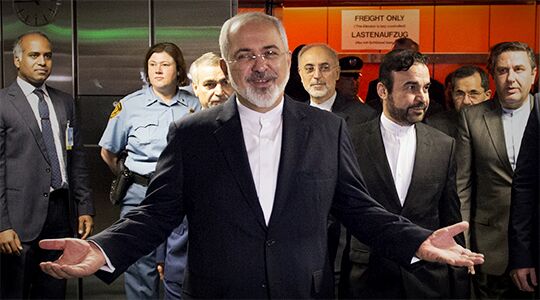
Nuclear Deal: Did Iran Need It or Want It?
Negotiation deadlines have come, gone, been extended, come and gone again. Yet a deal is finally here. United States President Barack Obama vehemently believes this deal is what Iran needs to rebuild its economy and join the international community.
The primary carrot President Obama dangled before Iran is the enticing promise of sanctions relief amounting to an estimated $150 billion. Those behind the negotiations think that this money will go toward dramatically improving Iran’s economy. Since major sanctions began hitting the nation in 2011, its economy has desperately needed relief. Removing the sanctions and allowing Iran to sell its oil and gas to international buyers would provide this relief.
But anyone who thinks Iran would devote most of these funds toward peaceful economic rehabilitation doesn’t know this regime.
Look at Iran’s priorities. What does it really want? Does it want first and foremost a stable economy, a place in the international community, and a high standard of living for the Iranian people? To the contrary, Iran has repeatedly proven itself willing to sacrifice these goals for other, more nefarious priorities. These goals become clear when one examines its activities over the past year alone, even while it has suffered under sanctions.
These facts and many more like them can be found in the U.S. State Department’s annual “Country Reports on Terrorism.” As it has for the past 21 years, Iran took the title as the world’s chief state sponsor of terrorism. The report paints Iran’s regional goals vividly—and those goals are clearly not driven by economic concerns.
Need more proof? Listen to Iran’s supreme leader, the man who needs to give final approval to this nuclear deal. Ayatollah Ali Khamenei hardly presents himself as a partner in peace. Instead, he is open and brash in continuing proclamations of his staunch hatred of Israel, America and the West. In March 2014, he expressed his disbelief in the Holocaust. A little later, he outlined nine reasons Israel should be eliminated. Vein-bulging, spittle-ridden attacks condemning America as the “Great Satan” and promising to drive Israel into the Mediterranean Sea are common from the ayatollah’s pulpit.
Anyone willing to look beyond the smiles of Mohammad Javad Zarif and Hassan Rouhani should clearly see that Iran’s ambitions are bloodthirsty and depraved. Radical Shia Iran is looking to create a worldwide Islamic caliphate, and it starts in the Middle East with conversion by the sword.
How might Iran bring that about? It starts with what it is already doing: stirring up instability. In that environment, Iran can promote and push the development of Shiite proxies while systematically weakening its regional enemies, primarily the Sunni Muslims.
Another way to bring about control would be to wield the power of nuclear weapons. Until Rouhani came to power, Iran was pursuing both options—and under the full weight of sanctions. Even now Iran is charging forward with aspects of both aims.
Iran isn’t primarily interested in wealth. Just look at Qatar, Saudi Arabia or the United Arab Emirates. All are supremely rich, yet all lack Iran’s power and influence—because finances and U.S. weapons alone don’t automatically grant power. Iran knows that it can gain the power it seeks faster through aggression than it can through economic means alone.
In effect, Iran doesn’t need the nuclear deal to secure its regional goals. Sure, $150 billion would help it accomplish those goals faster, but time and time again Iran has shown that it will continue its work regardless.
Already these negotiations have proved to be the most insane in history. But as time goes on, Iran is certain to ignore any nuclear obligations it has agreed to. Iran hasn’t shown itself prone to slowing down its efforts to dominate the Middle East no matter what outside nations do.
America has given in to Iran, no longer insisting on being able to make inspections anywhere, anytime, without restrictions. Iran has to give approval for inspections. The U.S. says it has negotiated a system of “managed access” to Iran’s nuclear sites that will allow it to “shield conventional, secret military facilities” from inspections. The U.S. says it is reasonable to allow Iran to protect its military secrets.
Writing for Commentary prior to the nuclear deal, Jonathan Tobin said, “If this administration were truly willing to walk away from a bad deal, their tactics wouldn’t be a matter of concern. But the relief about their flexibility about deadlines has been entirely premature. Whether they stay another two days, a week or a month, Iran knows that the Americans will cave in sooner or later. Whether the deadlines are respected or the talks are allowed to drag out endlessly, the Iranians seem to benefit either way.”
Russia has said it wants to ensure that Iran has access to weapons in order to combat terrorism. But the weapons ban is in place because of Iran’s sponsorship of terrorism! It’s the top state sponsor of terrorism in the world!
This logic is the equivalent of saying we plan to arm drug cartels in order to get their help in combating drug violence.
It is amazing how many aspects of this deal are rotten. Last week, Charles Krauthammer called it “the worst agreement in U.S. diplomatic history.” And that is no exaggeration.
